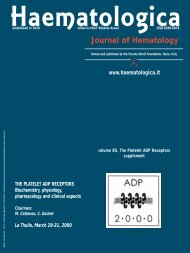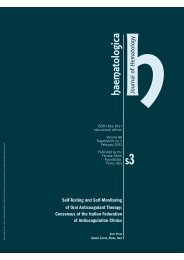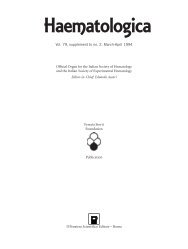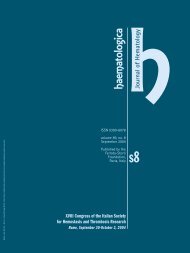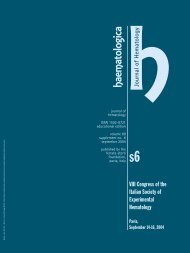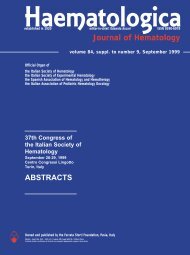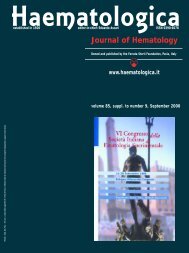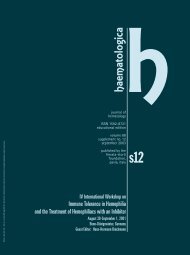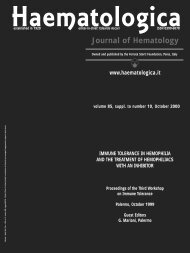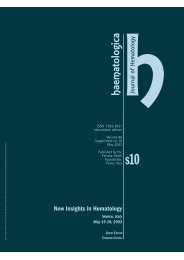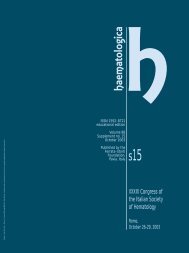Haematologica 2003 - Supplements
Haematologica 2003 - Supplements
Haematologica 2003 - Supplements
You also want an ePaper? Increase the reach of your titles
YUMPU automatically turns print PDFs into web optimized ePapers that Google loves.
was obtained. Results: Methylation of the FHIT gene was<br />
observed in 21(44%) of the 48 patients. Statistical correlation<br />
between the methylation of the FHIT gene and any clinical<br />
variable was not seen. The estimated 50% survival time of FHIT<br />
methylation group and unmethylation group were 20.2 months<br />
and 30.0 months, respectively (p=0.0042). By using univariate<br />
analysis, the following variables had adverse prognostic features:<br />
methylation of FHIT gene (p=0.0042), advanced age (61 years<br />
old, p=0.0384), bad performance status (ECOG performance<br />
status α to χ, p=0.0004), advanced stage (β, p= 0.0040), low level<br />
of hemoglobin (φ 8.5 g/dl, p=0.0042), low level of serum albumin<br />
(φ 3.5 g/dl, p0.5mg/dl, p=0.0031), elevated level of serum β2-microglobulin<br />
(>6.5 mg/l, p6.5 mg/l, p=0.0327) had statistical significance. Conclusion:<br />
These findings suggest that aberrant methylation of the FHIT<br />
gene may be an independent adverse prognostic factor for<br />
patients with MM.<br />
183<br />
SOCS-1 gene methylation is frequent but does not<br />
appear to have prognostic value in patients with<br />
multiple myeloma<br />
S. Depil1,2, G. Guillerm2,3, X. Leleu1, D. Hétuin2, D.<br />
Wolowiec4, F. Bauters1, T. Facon1, B. Quesnel1,2.<br />
1-Service des maladies du Sang, CHU de Lille, France, 2-Unité<br />
Inserm 524, IRCL, Lille, France, 3-Service de Cytogénétique, CHU<br />
de Lille, France, 4-Service d’Hématologie, CHU de Brest, France,<br />
5-Department of Haematology, Wroclaw Medical University,<br />
Wroclaw, Poland.<br />
Background. SOCS-1 is a negative regulator of the Jak/STAT<br />
signalling pathway. Aberrant methylation of SOCS-1 was<br />
initially shown in hepatocellular carcinoma (Yoshikawa, 2001).<br />
Recently, Galm and co-workers found SOCS-1 hypermethylation<br />
in 23/35 (63.9%) patients (pts) with multiple myeloma (MM)<br />
(Galm, 2002). In order to investigate the possible influence of<br />
SOCS-1 methylation on the clinical outcome of MM pts, we<br />
analyzed SOCS-1 gene methylation using methylation specific<br />
PCR (MSP) in a series of MM pts with long term follow-up.<br />
Patients and Methods. Fifty-one previously untreated MM pts<br />
were included in the study. Median age was 66 years (range 36-<br />
81). There were 33 males and 18 females. Clinical staging was:<br />
stage I, 8 (15.7%); II, 12 (23.5%); III, 31 (60.8%). M-component<br />
was Ig G in 30 (58.8%), Ig A in 15 (29.4%), Ig G +Ig A in one,<br />
Bence Jones in 3 (5.9%). Two pts (3.9%) had myeloma without<br />
M-component. Thirty-one patients (60.8%) were treated with<br />
melphalan-prednisone, 15 (29.4%) with intensive protocol, and 5<br />
(9.8%) were not treated. Bone marrow mononuclear cells from<br />
MM pts were isolated by Ficoll Hypaque sedimentation and<br />
extracted DNA was modified by bisulfite. SOCS-1 gene promoter<br />
regions were amplified with DNA methylated and unmethylated<br />
specific primers as previously described (Yoshikawa, 2001).<br />
Results. Fifty-one samples of MM bone marrow cells were<br />
analyzed by MSP. Median time follow-up was 9 years. Selective<br />
methylation of SOCS-1 was found in 38/51 pts (74.5%). No<br />
correlation could be made between SOCS-1 methylation and<br />
gender, age, isotype, level of M-component, stage of the disease,<br />
serum levels of albumin, creatinin, calcium, β2-microglobulin,<br />
LDH, C-reactive protein, or response to treatment. Overall<br />
survival was not significantly different between pts with<br />
methylated or unmethylated SOCS-1 gene (p= 0.58, log-rank<br />
test). In contrast pts presenting an elevated β2-microglobulin<br />
level had a significantly poorer prognosis (p= 0.033).<br />
Conclusion. Methylation of SOCS-1 is frequent in MM,<br />
occurring at frequencies of 75% in our series, and does not appear<br />
to have any significant prognostic value.<br />
184<br />
Plasma Cell Proliferation Index As A Clinical<br />
Prognosticator For Relapsed Multiple Myeloma<br />
Scott Ely, Morton Coleman, Mendel Roth, Paul Cristos,<br />
Vesna Najfeld, Larry Lyons, Michael W Schuster, Karen<br />
Pekle and Ruben Niesvizky<br />
The Center for Lymphoma and Myeloma, Weill Medical College of<br />
Cornell University, New York Presbyterian Hospital<br />
The plasma cell labeling index (PCLI) is a measure of plasma cell<br />
proliferative activity and has been shown to predict poor<br />
prognosis in newly diagnosed multiple myeloma (MM) patients.<br />
Other reports have demonstrated that PCLI is an independent<br />
prognostic indicator for patients with stable-plateau MM. Major<br />
drawbacks of this technique are that it is time-consuming,<br />
requires a degree of subjectivity in its interpretation, and is not<br />
readily available at all institutions. The plasma cell proliferation<br />
index (PCPI) is a double staining immunohistochemistry<br />
technique that allows identification of proliferating malignant<br />
plasma cells in a core biopsy by dual staining Ki-67/CD-138. It is<br />
far less time- consuming and can be consistently performed by a<br />
trained pathologist. High-dose pulsed dexamethasone (Dex) is<br />
one of the preferred treatments for relapsed MM patients and is<br />
currently the accepted gold standard against which investigational<br />
drugs are being tested. The predictors of outcome for relapsed<br />
patients while on Dex treatment have not been well established.<br />
We are therefore prospectively evaluating the PCPI in patients<br />
with relapsed MM receiving Dex in consecutive, prospective<br />
clinical trials. We intend to test its value as a predictor of<br />
response and time to progression (PD). Time to progression is<br />
defined as date of PD - date of Dex initiation. PCPI and<br />
cytogenetics results are being evaluated before Dex initiation in<br />
all enrolled patients. Sixteen patients with relapsed MM were<br />
evaluated. Eighty-one percent (n=13) and 19% (n=3) had IgG<br />
and IgA subtypes, respectively. Of the 16 patients, 56% (n=9)<br />
showed progressive disease at a median time of 87 days. The<br />
median PCPI for those patients with PD was 2.8, while the PCPI<br />
for those that did not show PD was 0.80. Cox-regression analysis<br />
revealed a 1.5 times greater likelihood of progression per unit<br />
increase in PCPI (p=0.07). In accordance with other studies, an<br />
abnormal cytogenetics profile predicted a worse prognosis<br />
(p=0.03). Our results, albeit in a small but homogeneous cohort<br />
of patients, supports the clinical utility of the PCPI in predicting<br />
which patients will progress after high-dose Dex treatment.<br />
Accrual continues and further analysis will be presented at the<br />
meeting.<br />
S169



